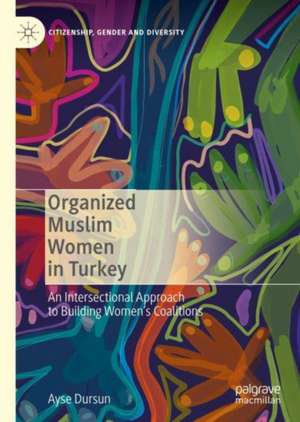Organized Muslim Women in Turkey: An Intersectional Approach to Building Women’s Coalitions: Citizenship, Gender and Diversity
Autor Ayşe Dursunen Limba Engleză Hardback – 26 oct 2022
This book explores the politics of organized Muslim women in Turkey and analyzes their coalitions with other—secular feminist, Kurdish, etc.—women’s movements from an intersectional perspective. It provides empirical evidence for significant changes in Muslim women’s politics under the ruling Justice and Development Party (AKP) and points to the increasing difficulty to build cross-movement women’s coalitions in the face of rising religious conservatism and authoritarianism under the AKP rule. While feminist Muslim women who display an intersectional understanding of structural inequality and oppression are found to be more resilient in the face of political pressure, conservative Muslim women dodge women’s coalitions and align with the government’s discourses and policies. Empirical evidence based on interviews with organized Muslim women also shows that prospects for coalition building largely depends on the specific societal and institutional (re-)configurations of patriarchy along with other relations of domination rather than mere ideological “difference” among women.
This book will be of interest to scholars and students across Gender Studies, Sociology, and Political Science, particularly those whose research focuses on intersectionality and social movements.
This book will be of interest to scholars and students across Gender Studies, Sociology, and Political Science, particularly those whose research focuses on intersectionality and social movements.
| Toate formatele și edițiile | Preț | Express |
|---|---|---|
| Paperback (1) | 692.74 lei 6-8 săpt. | |
| Springer International Publishing – 26 oct 2023 | 692.74 lei 6-8 săpt. | |
| Hardback (1) | 697.97 lei 6-8 săpt. | |
| Springer International Publishing – 26 oct 2022 | 697.97 lei 6-8 săpt. |
Preț: 697.97 lei
Preț vechi: 821.14 lei
-15% Nou
Puncte Express: 1047
Preț estimativ în valută:
133.57€ • 138.66$ • 111.38£
133.57€ • 138.66$ • 111.38£
Carte tipărită la comandă
Livrare economică 22 martie-05 aprilie
Preluare comenzi: 021 569.72.76
Specificații
ISBN-13: 9783031093074
ISBN-10: 3031093070
Pagini: 236
Ilustrații: XI, 236 p.
Dimensiuni: 148 x 210 x 21 mm
Greutate: 0.45 kg
Ediția:1st ed. 2022
Editura: Springer International Publishing
Colecția Palgrave Macmillan
Seria Citizenship, Gender and Diversity
Locul publicării:Cham, Switzerland
ISBN-10: 3031093070
Pagini: 236
Ilustrații: XI, 236 p.
Dimensiuni: 148 x 210 x 21 mm
Greutate: 0.45 kg
Ediția:1st ed. 2022
Editura: Springer International Publishing
Colecția Palgrave Macmillan
Seria Citizenship, Gender and Diversity
Locul publicării:Cham, Switzerland
Cuprins
1. Introduction.- 2. Gender Relations and Women’s Movements in Turkey.- 3. Patriarchy, Women’s Movements, and Coalitions: An Intersectional Framework.- 4. Intersectional Experiences with Structural Inequality and Privilege.- 5. Political Organization and Mobilization.- 6. Organized Muslim Women in Coalitions: Possibilities and Obstacles.- 7. Difficult but Necessary: Outlook for Women’s Coalitions (Research).
Notă biografică
Ayşe Dursun is a Post-Doctoral Researcher in the Department of Political Science at the University of Vienna, Austria. She does research on gender and politics, intersectionality, gender equality policies, social reproduction and care, social and women’s movements, and migration. She has published in a number of peer-reviewed journals including German Politics and Society, Historical Social Research, and Journal of Gender Studies. Ayşe Dursun is currently a steering committee member of the European Consortium for Political Research’s (ECPR) standing group on Gender and Politics..
Textul de pe ultima copertă
This book explores the politics of organized Muslim women in Turkey and analyzes their coalitions with other—secular feminist, Kurdish, etc.—women’s movements from an intersectional perspective. It provides empirical evidence for significant changes in Muslim women’s politics under the ruling Justice and Development Party (AKP) and points to the increasing difficulty to build cross-movement women’s coalitions in the face of rising religious conservatism and authoritarianism under the AKP rule. While feminist Muslim women who display an intersectional understanding of structural inequality and oppression are found to be more resilient in the face of political pressure, conservative Muslim women dodge women’s coalitions and align with the government’s discourses and policies. Empirical evidence based on interviews with organized Muslim women also shows that prospects for coalition building largely depends on the specific societal and institutional (re-)configurations of patriarchy along with other relations of domination rather than mere ideological “difference” among women.
This book will be of interest to scholars and students across Gender Studies, Sociology, and Political Science, particularly those whose research focuses on intersectionality and social movements.
This book will be of interest to scholars and students across Gender Studies, Sociology, and Political Science, particularly those whose research focuses on intersectionality and social movements.
Ayşe Dursun is a Post-Doctoral Researcher in the Department of Political Science at the University of Vienna, Austria. She does research on gender and politics, intersectionality, gender equality policies, social reproduction and care, social and women’s movements, and migration. She has published in a number of peer-reviewed journals including German Politics and Society, Historical Social Research, and Journal of Gender Studies. Ayşe Dursun is currently a steering committee member of the European Consortium for Political Research’s (ECPR) standing group on Gender and Politics.
Caracteristici
Provides original data for the growing field of (women’s) social movement research Offers empirical evidence for new challenges and prospects for coalitional politics under neoliberal contexts Introduces an intersectional conceptualization of patriarchy
















